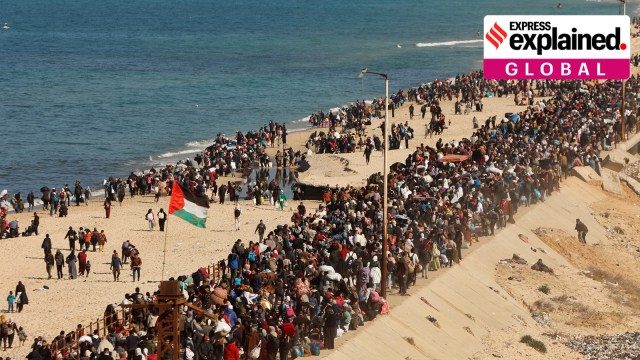Trump’s Palestinian Resettlement Analysis: US President Donald Trump said that in a recent call with Jordan’s King Abdullah, he asked the leader to take in Palestinians in his country to “just clean out” the Gaza Strip. “I’d like Egypt to take people. And I’d like Jordan to take people,” he told reporters on Saturday (January 25). “You’re talking about a million and half people, and we just clean out that whole thing,” he added.

However, the idea was immediately opposed, with Jordan’s foreign minister Ayman Safadi saying on Sunday that their opposition to Trump’s proposal was “firm and unwavering.” Egypt’s foreign minister also said in a statement that transferring Palestinians “risks expanding the conflict in the region.”
Story continues below this ad
What is the likely reason behind the resettlement bid? And why have these countries refused to shelter Palestinian refugees in the wake of Israel’s military offensive on the Gaza Strip since 2023? We explain.
First, what is the status of displaced Palestinians?
Following the ceasefire negotiated between the Palestinian militant group Hamas and Israel earlier this month, Palestinians have been trying to return to their homes. Most of the settlements in major cities have been reduced to rubble due to Israeli attacks.
Around 90% of Gaza’s 2.3 million residents have been displaced since October 2023, when Israel began its offensive following Hamas’ attack on Israel. However, even before the latest round of conflict, many Palestinians have left their country at different points to escape the violence and instability. The biggest such forced migration was in 1948 itself – when the modern Israeli state was created. Called the nakba in Arabic (meaning the catastrophe), it led to the displacement of 750,000 Palestinians amid the upheaval.
Many sought refuge elsewhere and registered with the United Nations Relief and Works Agency for Palestine Refugees (UNRWA). Today, one-third of such refugees and their descendants, totalling more than 1.5 million individuals, live in 58 UN-recognised refugee camps in Jordan, Lebanon, Syria, and a few other nations.
Story continues below this ad
Citing UNRWA figures, Deutsche Welle reported that “In Jordan, around 2.3 million people are registered as Palestinian refugees. It is the only Arab country that has granted citizenship to this group—more than half of the Jordanian population is already of Palestinian origin”.
In Lebanon, around 80% of Palestinian refugees live below the poverty line. They cannot buy property, are not allowed to work in all professions and have no access to the state education and healthcare systems, it added.
What’s explains the bid for resettlement?
According to Article 11 of UN Resolution 194 from 1948, all refugees have the right to return home if they are willing to live peacefully with their neighbours. However, that has not prevented Israel from advocating for re-settling Palestinians in the past. At least since the first Arab-Israeli War of 1967, won by Israel, it has sought to deepen control over the West Bank by settling communities in violation of international law.
The UN said in September 2023, “Pointing to ongoing expansion of Israeli settlements, demolition of Palestinian structures, daily violence and continued inflammatory rhetoric by their Government representatives, a senior United Nations official reiterated to the Security Council the Secretary-General’s appeal for an end to the occupation and a resolution of the conflict in pursuit of the two-State solution”.
Story continues below this ad
Allowing Palestinians back also undermines Israeli claims to statehood. For Palestinians too, if they were to leave the region in large numbers, there are worries about Israel taking control of more territory.
The New York Times reported in February 2024 that many Israelis affiliated with the settler “movement” have been emboldened by support from Prime Minister Benjamin Netanyahu’s ruling right-wing government. It said, “Already, settler leaders are drawing up plans to infiltrate Gaza, hoping to build unauthorized villages that could eventually be recognized. In early February, over 100 activists entered a closed military zone near the border, trying to breach Gaza. The military turned them away.”
The US has cautioned against such plans previously. A statement from the State Department in 2023 criticised some Israeli ministers’ support for migrating Israelis to Gaza. “This rhetoric is inflammatory and irresponsible. We have been told repeatedly and consistently by the government of Israel, including by the Prime Minister, that such statements do not reflect the policy of the Israeli government,” it said. “We have been clear, consistent, and unequivocal that Gaza is Palestinian land and will remain Palestinian land, with Hamas no longer in control of its future and with no terror groups able to threaten Israel,” it added.
What’s behind Egypt and Jordan’s refusal?
Jordan, which borders Palestine on the East, and Egypt, bordering it towards the south, have both rejected offers to take in more Palestinian refugees. Though they have diplomatic relationships with Israel, they also support a two-state solution to the Israel-Palestine conflict.
Story continues below this ad
Egyptian President Abdel Fattah el-Sissi said in 2023 that such a migration would also help in “eliminating” the Palestinian cause. Further, he argued, the presence of Palestinian militants could pose a security challenge for Egypt. He said Egypt’s Sinai Peninsula, which borders Gaza, “would become a base for attacks on Israel. Israel would have the right to defend itself… and would strike Egyptian territory.”
The Associated Press detailed the case of Lebanon in the 1970s, after it allowed Palestinian refugees. “Yasser Arafat’s Palestine Liberation Organisation, the leading militant group of its time, transformed the country’s south into a launchpad for attacks on Israel. The refugee crisis and the PLO’s actions helped push Lebanon into a 15-year civil war in 1975.”








































